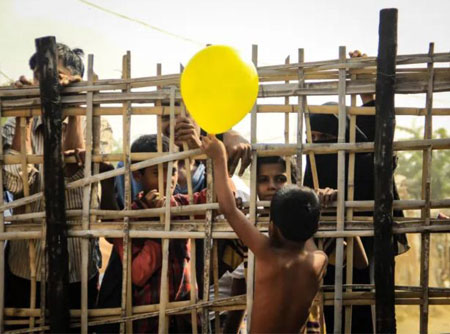Zenaira Bakhsh
On May 5, the news about the deportation of Jafar Alam, one of the refugees living in Jammu, spread across the community living in Jammu. Earlier, on April 17, Alam had been detained in Hiranagar sub-jail of Jammu.
“His family was told that there was some technical issue in his refugee verification proof and he would be released soon,” said Ali Johar, co-founder of Rohingya Human Rights Initiative, an organization documenting and highlighting human rights violations against Rohingya Muslims in India.
The UNHCR has provided refugee identification proofs to the Rohingya Muslim refugees for their protection, identity management and documentation. Alam’s deportation, despite holding refugee verification proof, within two weeks of his detention has sparked fears amongst the refugees as the process was completed by the police within two weeks of his detention.
“The procedure is that when a refugee is detained, his verification is done through the Myanmar embassy before deportation,” said Johar. “This happened too fast.”
After his deportation, Alam’s wife and six kids are left helpless since Alam, a daily wager, was the only earning member of the family. “He has been handed over to the Myanmar police. Now the procedure is that he’ll be taken into quarantine for about ten days and then he’ll be taken into detention,” Johar said. Earlier, a 37-year-old woman, another refugee proof holder, was deported to Myanmar after one year of detention in the Hiranagar sub-jail. Her husband and three children, however, remain in Jammu. “There is absolutely no one left in her village, and she has been kept under detention there for now,” Johar told Maktoob.
Refugees have started fleeing to other cities or back to Bangladesh. During the last few months, said Johar, about 218 refugees have been detained, most of them separated from their families. “They randomly detain 6 to 7 refugees from different camps, just like they did with Jaffar,” said Johar.
Fazal Abdali, an independent lawyer working for the refugees for about a decade said that deporting the refugees within two weeks of the detention is not legal. “The process can only take place when Myanmar police confirm that the detainee is a resident of the country,” Abdali told Maktoob.
A refugee living in India with verification proof is protected by the international laws and the constitution of India even though India does not have its own refugee law. “These people should still be protected because the constitution is very clear that the right to life of every person should be protected. So when you are deporting a person back to the country they fled, where is the right to life?” questioned Abdali.
“Their life is in danger and this is a violation of the constitution.” Under Article 21, the rights to life and liberty are guaranteed to the people, said Abdali, however, “life is with dignity”.
“You cannot just keep them like cattle separated from their families. Everything goes through the constitution and refugee unification is an important international law,” he said.
Meenakshi Ganguly, South Asia Director at Human Rights Watch told Maktoob that the rights of refugees are protected under the universal principles around non-refoulment. “It means that no one should be returned to a place where they might be at a risk of serious human rights violations,” she said.
While India has not signed the UN refugee convention, Ganguly said that the universal principles apply to the Rohingya refugees who fled for saving their lives during the genocide. “Since February 2021, the same military has grabbed power in a coup. To return any refugee to Myanmar is to place them at severe risk and violates India’s international obligations,” she said.
“The United Nations should raise concerns with the Indian authorities about the deportation of Rohingya to Myanmar.”
—Courtesy Maktoob Media










